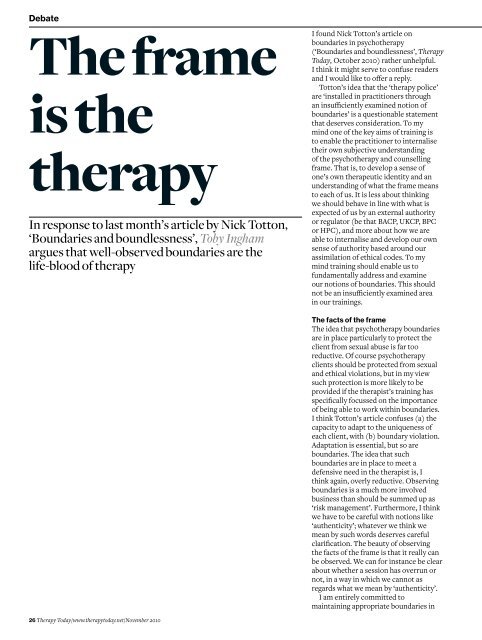Therapy Today
15301_november%202010
15301_november%202010
You also want an ePaper? Increase the reach of your titles
YUMPU automatically turns print PDFs into web optimized ePapers that Google loves.
Debate<br />
The frame<br />
is the<br />
therapy<br />
In response to last month’s article by Nick Totton,<br />
‘Boundaries and boundlessness’, Toby Ingham<br />
argues that well-observed boundaries are the<br />
life-blood of therapy<br />
I found Nick Totton’s article on<br />
boundaries in psychotherapy<br />
(‘Boundaries and boundlessness’, <strong>Therapy</strong><br />
<strong>Today</strong>, October 2010) rather unhelpful.<br />
I think it might serve to confuse readers<br />
and I would like to offer a reply.<br />
Totton’s idea that the ‘therapy police’<br />
are ‘installed in practitioners through<br />
an insufficiently examined notion of<br />
boundaries’ is a questionable statement<br />
that deserves consideration. To my<br />
mind one of the key aims of training is<br />
to enable the practitioner to internalise<br />
their own subjective understanding<br />
of the psychotherapy and counselling<br />
frame. That is, to develop a sense of<br />
one’s own therapeutic identity and an<br />
understanding of what the frame means<br />
to each of us. It is less about thinking<br />
we should behave in line with what is<br />
expected of us by an external authority<br />
or regulator (be that BACP, UKCP, BPC<br />
or HPC), and more about how we are<br />
able to internalise and develop our own<br />
sense of authority based around our<br />
assimilation of ethical codes. To my<br />
mind training should enable us to<br />
fundamentally address and examine<br />
our notions of boundaries. This should<br />
not be an insufficiently examined area<br />
in our trainings.<br />
The facts of the frame<br />
The idea that psychotherapy boundaries<br />
are in place particularly to protect the<br />
client from sexual abuse is far too<br />
reductive. Of course psychotherapy<br />
clients should be protected from sexual<br />
and ethical violations, but in my view<br />
such protection is more likely to be<br />
provided if the therapist’s training has<br />
specifically focussed on the importance<br />
of being able to work within boundaries.<br />
I think Totton’s article confuses (a) the<br />
capacity to adapt to the uniqueness of<br />
each client, with (b) boundary violation.<br />
Adaptation is essential, but so are<br />
boundaries. The idea that such<br />
boundaries are in place to meet a<br />
defensive need in the therapist is, I<br />
think again, overly reductive. Observing<br />
boundaries is a much more involved<br />
business than should be summed up as<br />
‘risk management’. Furthermore, I think<br />
we have to be careful with notions like<br />
‘authenticity’; whatever we think we<br />
mean by such words deserves careful<br />
clarification. The beauty of observing<br />
the facts of the frame is that it really can<br />
be observed. We can for instance be clear<br />
about whether a session has overrun or<br />
not, in a way in which we cannot as<br />
regards what we mean by ‘authenticity’.<br />
I am entirely committed to<br />
maintaining appropriate boundaries in<br />
26 <strong>Therapy</strong> <strong>Today</strong>/www.therapytoday.net/November 2010


